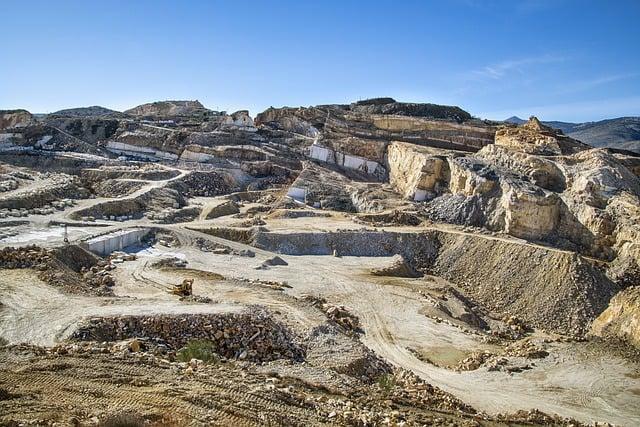In a significant stride towards enduring growth, the Global Center on Adaptation (GCA) has announced a groundbreaking partnership with the african Development Bank (AfDB) to enhance climate-resilient mining logistics in Mauritania. This collaboration aims to address the pressing challenges posed by climate change while bolstering the country’s mining sector, which is a crucial driver of its economy. As mauritania continues to navigate the complexities of its natural resource management,this initiative seeks to create a pathway for sustainable expansion that not only supports economic growth but also prioritizes environmental resilience. By integrating innovative practices and sustainable strategies,GCA and afdb are set to redefine the landscape of mining logistics in a region vulnerable to climate fluctuations,ensuring that the industry can thrive amidst changing climate conditions. This article explores the implications of this partnership and its potential to transform Mauritania’s mining sector into a model of climate adaptation.
GCA and African Development Bank Collaborate for Sustainable Mining Solutions in Mauritania
The collaboration between the Global Center on Adaptation (GCA) and the african Development Bank marks a significant step towards sustainable mining practices in Mauritania. This initiative aims to enhance the resilience of mining logistics amid the challenges posed by climate change. Through their partnership, the two organizations will focus on implementing innovative strategies that prioritize environmental protection while ensuring economic growth in the region. Key areas of focus include:
- Development of Climate-Resilient Infrastructure: investing in durable transportation and processing systems designed to withstand climate impacts.
- Capacity Building: Enhancing the skills and knowledge of local mining stakeholders to adopt sustainable practices.
- Research and Data Analysis: Utilizing data to inform decision-making processes in mining operations, leading to better environmental management.
As part of this partnership, GCA and the African Development bank will also explore financing mechanisms to support the integration of sustainable technologies in the mining sector. This includes creating financial instruments that incentivize eco-friendly practices and enable the adoption of clean energy solutions. The initiative is poised to drive economic opportunities while promoting the responsible use of Mauritania’s rich mineral resources. A summary of the envisioned projects is displayed in the table below:
| Project Focus | Objectives | Timeframe |
|---|---|---|
| Infrastructure Development | Build climate-resilient mining logistics | 2024-2026 |
| Local Training Programs | Enhance stakeholder skills in sustainability | 2024-2025 |
| Research Initiatives | Analyse climate impact on mining operations | 2024-2027 |
Enhancing Climate Resilience in Mining Logistics: Strategies for Success

The Global Center on Adaptation (GCA) is paving the way for a sustainable future in Mauritania’s mining sector through a strategic partnership with the african Development Bank. This collaboration focuses on incorporating climate resilience into mining logistics, ensuring that operations can withstand the rigors of climate change while maintaining efficiency and productivity. The initiative emphasizes the importance of understanding local climate conditions and tailoring logistics to minimize disruptions caused by extreme weather events. Key elements of this approach include:
- Infrastructure Investment: Upgrading transportation networks and storage facilities to withstand climate impacts.
- Data-Driven Decision Making: Utilizing climate risk assessments and predictive analytics for more accurate planning.
- Community Engagement: Involving local stakeholders to address environmental concerns and leverage indigenous knowledge.
- Innovative Technologies: Implementing advanced logistics solutions that enhance flexibility and responsiveness.
To support these efforts, a comprehensive framework has been developed to guide mining companies in adopting sustainable practices. This framework includes capacity-building programs aimed at equipping local operators with the skills necessary to implement climate-resilient strategies. Moreover, it advocates for public-private partnerships that leverage funding and expertise for projects that prioritize sustainability. The framework is summarized in the table below:
| Strategy | Description |
|---|---|
| Training workshops | Enhancing local skills in best practices for climate resilience. |
| Investment Partnerships | Encouraging collaboration between governmental agencies and private investors. |
| Research Initiatives | Funding studies focused on climate impacts specific to the mining region. |
Innovative Technologies Driving Sustainable Practices in MauritaniaŌĆÖs Mining Sector

In an era where sustainability is paramount, Mauritania’s mining sector is leveraging innovative technologies to enhance both productivity and environmental stewardship. Cutting-edge practices such as automated resource management systems are being implemented to optimize mineral extraction while minimizing ecological footprints. These technologies allow for precise tracking of resource use and waste management, ensuring that mining operations align with sustainable practices. Other advancements include the adoption of renewable energy sources,such as solar and wind power,to reduce reliance on fossil fuels within mining logistics. This transition not only aids in carbon footprint reduction but also allows for the diversification of energy sources within the sector.
Moreover, the integration of data analytics and IoT (Internet of Things) enables real-time monitoring of environmental impacts, empowering mining companies to make data-driven decisions that promote resilience against climate change. By using sensors and smart devices,operators can monitor air quality,water usage,and ecosystem health,leading to more informed operational strategies. The establishment of collaborative partnerships, like that between the Global Center on Adaptation and the African Development Bank, facilitates the sharing of knowledge and resources necessary for implementing these technologies across the industry, fostering a more sustainable future for MauritaniaŌĆÖs mining landscape.
Recommendations for Policy makers: Aligning Mining Operations with climate Goals

To achieve a successful alignment of mining operations with climate goals, policymakers must prioritize a comprehensive framework that emphasizes sustainable practices. This includes fostering collaboration between the mining sector and environmental organizations to create stringent guidelines that promote ecological integrity. Essential measures shoudl include:
- Incentivizing Green Technologies: Encourage investments in clean energy solutions for mining operations.
- Regulatory Reform: Implement regulations that hold mining companies accountable for their carbon emissions.
- Community Engagement: Involve local communities in decision-making processes to ensure that their voices are heard.
furthermore, robust financial mechanisms must be established to support the transition to climate-resilient mining practices. Policymakers should consider the following strategies:
| Strategy | Description |
|---|---|
| Tax Incentives | Provide tax breaks for companies that demonstrate a commitment to sustainable operations. |
| Research Funding | Allocate funds for research in technology that mitigates environmental impact. |
| Partnerships | Encourage collaboration between governments, NGOs, and the private sector to share knowledge and resources. |
The Role of Local communities in Advancing Climate-Resilient Mining Initiatives

Local communities play a pivotal role in the evolution of climate-resilient mining initiatives, especially when it comes to adapting operations to the challenges posed by climate change. Their involvement ensures that initiatives are not only technically sound but are also socially accepted and culturally relevant. By fostering participation at the grassroots level,these communities contribute valuable insights that can optimize logistical strategies,minimize environmental impact,and enhance social benefits.This collaboration promotes a sense of ownership, empowering locals to advocate for sustainable practices that align with their needs and priorities. Key areas where communities can exert influence include:
- Resource Management: Local knowledge can guide sustainable extraction practices.
- Monitoring Environmental Impact: Community members can often identify problems more swiftly than external stakeholders.
- Stakeholder Engagement: Engaging local populations fosters trust and openness.
- job Creation: prioritizing local workforce development can minimize economic displacement.
Moreover, successful climate-resilient mining initiatives hinge on the establishment of partnerships that connect technical expertise with community needs. Through programs and workshops facilitated by organizations like the global Center on adaptation and the African Development Bank, communities can gain access to vital training and resources.These joint efforts facilitate the development of robust frameworks that address climate risks while enhancing livelihoods.To illustrate this symbiotic relationship, consider the following table that encapsulates key benefits derived from community engagement in mining logistics:
| Benefit | Description |
|---|---|
| Enhanced Local knowledge | Communities provide insights on environmental conditions and best practices. |
| Sustainable Development | Aligning mining activities with local sustainability goals. |
| Strengthened Resilience | Adaptation strategies that consider community vulnerabilities. |
| Economic Growth | Boosting local economies through job creation and infrastructure investments. |
Evaluating the Long-term impact of climate-Resilient Practices on MauritaniaŌĆÖs Economy

the commitment to implementing climate-resilient practices in Mauritania goes beyond immediate ecological benefits; it stands as a critical pivot for the nation’s economic trajectory. As the mining logistics sector expands, integrating sustainability measures intends to bolster job creation, enhance local livelihoods, and improve environmental stewardship. Key stakeholders, including the Global Center on Adaptation, are focusing on innovative adaptive strategies that foster resilience against climate shocks. This shift not only aims to protect natural resources but also to stabilize economic activities vulnerable to climate risks.
Furthermore, the synergy between Mauritania and the African Development bank promises to usher in a new era of economic viability characterized by sustainable growth. The projected outcomes of these initiatives include:
- Increased Investment: Attracting both domestic and foreign investors interested in sustainable mining practices.
- enhanced Infrastructure: Development of eco-friendly transport networks to facilitate efficient logistics.
- Improved Community Engagement: Empowering local populations through training and involvement in climate-smart practices.
- Resilience to Market Fluctuations: Establishing reliable supply chains that withstand economic disruptions.
| Impact Area | Expected Long-term benefits |
|---|---|
| Environment | Reduced carbon footprint and enhanced biodiversity |
| Economy | Stable growth amidst climate challenges |
| Society | Strengthened community resilience and socioeconomic equity |
In Retrospect
the partnership between GCA and the African Development Bank represents a significant step towards enhancing the resilience of Mauritania’s mining logistics in the face of climate change. This initiative not only aims to bolster the countryŌĆÖs economy through sustainable practices but also sets a crucial precedent for adaptive strategies in the mining sector across Africa.By prioritizing climate resilience,this collaborative effort underscores the importance of integrating environmental considerations into economic development. As Mauritania moves forward, it serves as a model for other nations grappling with similar challenges, demonstrating that proactive and inclusive measures can lead to a more sustainable and equitable future for all. as global dialog increasingly emphasizes the imperative of climate action, initiatives like these are essential in bridging the gap between economic growth and environmental stewardship.







